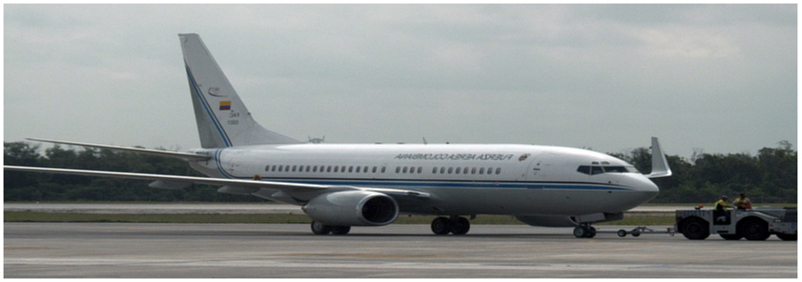Colombia Uses Presidential Jet Amid US Sanctions

The Government of Colombia, led by President Gustavo Petro, has taken decisive action to manage the return of Colombian citizens deported from the United States by deploying the nation’s presidential aircraft. This move comes in response to escalating tensions between Colombia and the US, following a series of diplomatic disputes over deportation flights and trade policies.
On January 26, 2025, US President Donald Trump announced the immediate imposition of a 25% customs duty on imports from Colombia. This decision was triggered after Colombia initially refused to accept two C-17 military transport aircraft carrying Colombian nationals expelled from the United States. In retaliation, President Petro revoked the diplomatic transport authorization previously granted to the Colombian government, compelling the United States Air Force (USAF) aircraft to reroute to Honduras instead of landing in Colombia.
The situation heightened diplomatic strains between the two nations, with the US threatening further economic sanctions and restrictions. However, in a subsequent statement, President Trump indicated a willingness to suspend these threats. The White House clarified that tariffs and sanctions would remain in reserve and would only be enacted if Colombia failed to honor the newly reached agreement.
“The Government of Colombia has agreed to all of President Trump’s terms,” the White House statement read. “Tariffs and sanctions will be held in reserve, and not signed, unless Colombia fails to honor this agreement.” Despite this temporary easing of tensions, the US maintained stringent measures against Colombia, including a ban on entry into the United States and visa revocations for Colombian government officials. Additionally, “enhanced entry inspections” for all Colombian nationals and goods were implemented, remaining in effect until Colombia complies with accepting the first deportation flight.
In response to these developments, Colombia has mobilized its presidential aircraft to ensure the safe and orderly return of its citizens. The aircraft in question is a Boeing 737-700 BBJ (Boeing Business Jet) registered as FAC-0001 and operated by the Colombian Air Force. Equipped with a VIP cabin, the jet can accommodate up to 54 passengers, providing a secure and comfortable means for deported individuals to return to Colombia. The aircraft has been in service since July 2006 and remains a crucial asset for the Colombian government in managing high-profile and sensitive transportation needs.
President Gustavo Petro emphasized the importance of maintaining sovereignty and protecting Colombian citizens during this period of heightened diplomatic tension. By utilizing the presidential jet, Colombia ensures that its nationals are returned safely without further complications or delays that might arise from relying solely on military transport aircraft.
The ongoing dispute underscores the fragile nature of international relations between Colombia and the United States, particularly concerning immigration and trade policies. The imposition of customs duties and the revocation of diplomatic privileges highlight the leverage that economic and diplomatic tools can exert in resolving such conflicts. As both nations navigate this challenging landscape, the resolution of deportation flight disputes and the stabilization of trade relations remain pivotal for bilateral cooperation and regional stability.
Looking forward, the Colombian government remains committed to fostering positive relations with the United States while safeguarding its national interests and the well-being of its citizens. President Petro’s administration is actively seeking diplomatic channels to mitigate the impact of US sanctions and to negotiate more favorable terms that respect Colombia’s sovereignty and economic aspirations.
The deployment of Colombia’s presidential aircraft represents a strategic and measured response to the ongoing diplomatic challenges with the United States. As both countries work towards resolving their differences, the focus remains on ensuring the safe return of deported citizens and the restoration of stable and mutually beneficial relations. The situation serves as a reminder of the complexities inherent in international diplomacy and the critical role of strategic assets like the presidential jet in navigating such challenges.
For airline network planners and international relations analysts, Colombia’s recent actions provide valuable insights into how nations can leverage both diplomatic and logistical resources to address and resolve conflicts. As the global landscape continues to evolve, the ability to adapt and respond effectively to geopolitical tensions will remain essential for maintaining national integrity and fostering international cooperation.
Related News : https://suspicious-zhukovsky.67-21-117-18.plesk.page/category/air-travel-business/airline-finance/
